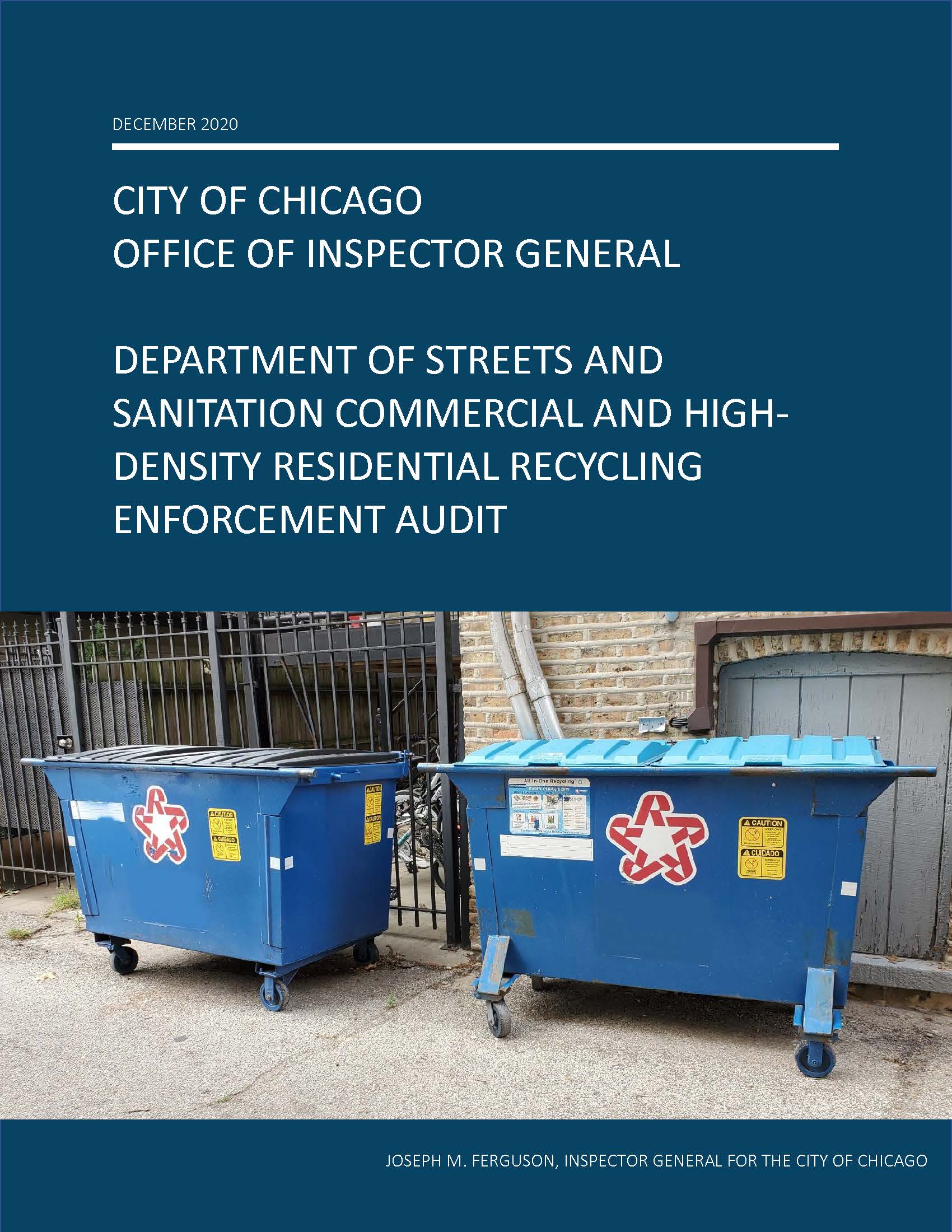Department of Streets and Sanitation Commercial and High Density Residential Recycling Enforcement Audit
Summary
The Office of Inspector General conducted an audit of the Department of Streets and Sanitation’s enforcement of recycling requirements for commercial and high-density residential buildings. Our objective was to determine if DSS ensures that building owners provide collection services required by the Chicago Recycling Ordinance.
Executive Summary
The Office of Inspector General (OIG) conducted an audit of the Department of Streets and Sanitation’s (DSS) enforcement of recycling requirements for commercial and high-density residential buildings. Our objective was to determine if DSS ensures that building owners provide collection services required by the Chicago Recycling Ordinance.
The Chicago Recycling Ordinance (the Ordinance) states that owners or occupants of such buildings “shall contract with a private hauler, or cause a contract to be entered into with a private hauler, for the provision of source-separated recycling services […].” The City is required to provide buildings found in violation of this requirement 30 days to come into compliance. Continued noncompliance can result in fines ranging between $500 and $5,000 per day. The Ordinance also requires private haulers to submit annual reports detailing the source, type, and amount of recyclables collected. This information would assist DSS in calculating waste diversion rates, setting goals, and monitoring progress toward those goals.
A. CONCLUSION
OIG concluded that DSS does not ensure commercial and high-density residential building owners provide the required recycling services. In addition, DSS does not ensure private haulers submit complete, accurate, and timely reports detailing the buildings they served, and the amount and type of materials hauled.
B. FINDINGS
DSS does not thoroughly enforce the Chicago Recycling Ordinance requiring commercial and high-density residential building owners to provide recycling services. In fact, the Department’s Mobile E-Ticket (MET) citation system does not even allow users to issue citations for Ordinance violations. This creates a significant barrier to enforcement. Notably, when the former Department of Environment (DOE) was responsible for enforcing the Ordinance it was capable of issuing citations. The City disbanded DOE in 2011, however, and transferred responsibility for enforcement to DSS. The Department acknowledged that it has not met this responsibility, and has focused instead on operating the City’s blue cart recycling program for residential buildings with one to four units.
Although DSS does not maintain a list of high-density residential buildings, data from the Census Bureau’s 2018 American Community Survey shows that nearly 500,000 Chicago households, about 41%, are in buildings with five or more units.1 In addition, there are approximately 60,000 licensed businesses in Chicago that are required to procure private refuse and recycling hauling services.2 Without enforcement of the Ordinance, many of these households and businesses may not be recycling.
OIG also found that DSS does not ensure private haulers submit complete, accurate, and timely annual reports detailing the buildings they served, and the amount and type of materials hauled. The Ordinance requires haulers to provide these reports by February 28th each year or risk fines. Furthermore, the Ordinance requires the DSS commissioner to “review and approve the adequacy” of each annual report submitted by a private hauler. In addition to citing haulers for submitting late or incomplete reports, the ordinance allows DSS to refer them to the Department of Business Affairs and Consumer Protection (BACP), which is authorized to withhold renewal of the hauler’s business license until the hauler files a complete report.
In 2018, there were 15 licensed private waste haulers subject to the Ordinance’s reporting requirements. Of the 15 required reports, DSS,
• possessed nine, three of which were submitted after the February 28, 2019 deadline;
• obtained four upon OIG’s October 2019 request; and
• did not possess or obtain two.
In addition, private haulers did not fully complete 5 of the 13 reports, thereby preventing DSS from calculating their waste diversion rates and including them in a citywide waste diversion rate. Finally, DSS did not review the adequacy of the hauler reports or cite haulers for failure to submit timely and complete reports. The data in these reports could help DSS calculate diversion rates, set goals, and monitor progress toward those goals.
C. RECOMMENDATIONS
OIG recommends that DSS, working with the Department of Law (DOL) and the Department of Assets, Information and Services (AIS), if necessary, configure the MET system to allow users to issue citations for violations of the Ordinance. DSS should consistently record and monitor the outcomes of recycling inspections to determine, for example, whether building owners received 30-day notices and ultimately came into compliance or were issued citations. In coordination with the City’s new chief sustainability officer, DSS should develop a program to enforce the Ordinance proactively, in addition to responding to complaints.
DSS should also ensure that haulers submit complete, accurate, and timely reports. As required by the Ordinance, DSS should review each annual report and notify BACP of noncompliant haulers. DSS should review the design of the annual reports to ensure it supports the City’s recycling goals. The Department should also develop procedures to incorporate private haulers’ diversion data into a citywide waste diversion rate. Finally, DSS should ensure that private haulers report all customers who decline recycling services and should consider requiring each hauler to submit a list of buildings it serves.
D. DSS RESPONSE
In response to our audit findings and recommendations, DSS stated that it agrees and will implement corrective actions. DSS has begun working with DOL and AIS to revise citation processes and add the ordinance to the MET system. The City has engaged a consultant to conduct a comprehensive waste study, and DSS will await the results before developing a proactive enforcement strategy. The waste study will also inform any changes to the design, collection, and usage of private hauler reports.
The specific recommendations related to each finding, and DSS’ response, are described in the “Findings and Recommendations” section of this report.
Subscribe to the OIG Bulletin to get notified about future publications.

